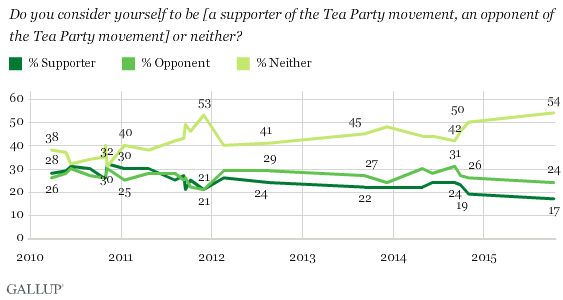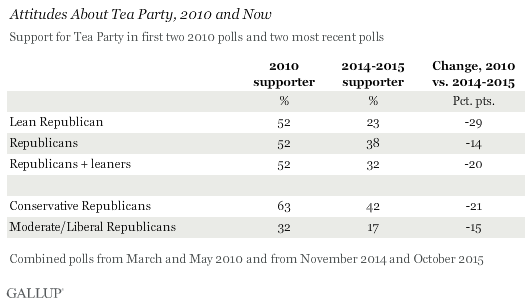By Jim Norman and Glynn Wilson –
WASHINGTON, D.C. — Americans’ support for the so-called “tea party” has dropped to its lowest level since the movement emerged on the national political scene prior to the 2010 midterm elections, according to the latest Gallup poll on the subject. Only 17 percent of Americans now say they consider themselves tea party supporters.
The tea party emerged in 2009 in opposition to the new Obama administration’s proposal to pass the first ever law regulating the health care industry, and many Americans took sides for or against the movement in the midterm elections the next year when support peaked at 32 percent in November 2010, according to Gallup’s numbers.
The anti-government, anti-Washington movement was widely credited by the mainstream media with helping the Republican Party gain control of the U.S. House of Representatives.
As support gradually eroded over the next year, opponents of the tea party gained the upper hand and have led supporters in all 10 Gallup polls measuring views of the movement since the start of 2012. Since August 2012, support has failed to reach 25 percent, and it has fallen below 20 percent in each of the last two polls.
Meanwhile, opposition peaked at 31 percent just ahead of last year’s midterm elections, but has dropped to 24 percent in the most recent Gallup poll.
“Support for and opposition to the tea party movement have been consistently divided along ideological and political lines over the last five years, with Republicans and conservatives the biggest supporters, and Democrats and liberals the strongest opponents,” Gallup says.
A comparison of the combined results of the first two Gallup polls measuring tea party support, in March and May 2010, and the two most recent polls, from this month and November of last year, reveals where support and opposition are strongest and where the most significant changes have taken place.
Almost two-thirds (63 percent) of conservative Republicans were supporters in the earliest polls. About four in 10 (42 percent) still support the tea party, but the 21-percentage-point drop since the 2010 polls is second only to the plunge in support from Republican leaners (independents who lean toward the GOP). A majority (52 percent) of GOP leaners, a key source for Republican votes, were supporters in the 2010 polls, but a 29-point drop has left only 23 percent still supporting the movement.
On the other side, liberal Democrats were the strongest opponents (61 percent) in the two 2010 polls, and their opposition was almost as high (59 percent) in the two most recent polls.
A few groups that were more likely to be supporters than opponents in 2010 have since switched sides, including those 65 and older, and those who are married.
“While support for the tea party has not increased among any major subgroup since 2010, opposition to it has gone up among one — those with postgraduate education,” Gallup says. “In the earlier polls, 36 percent of this group opposed the tea party, and that number has grown to 53 percent.”
So the most educated people in the country are the most opposed to this fledgling movement.
Meanwhile, opposition has dropped in a few groups — 18- to 29-year-olds, those with low incomes and unmarried females — because more in these groups no longer have an opinion about the tea party.
The bottom line is, it is clearly dying as a movement and becoming irrelevant in American politics.
Gallup’s Bottom Line
“Republicans made huge strides in the 2014 midterm elections, including increasing their majority in the House and gaining control of the Senate. However, the tea party movement that had played such a huge part in the GOP’s 2010 election successes was much less visible this time around,” Gallup says in its careful worded analysis. “Still, several Republicans elected to the House and Senate with tea party support have become major players on the national stage, including presidential candidates Marco Rubio and Ted Cruz.”
The tea party movement has also been tied to the Freedom Caucus, a group of conservative Republican members of the House who have played a key role in the current battle to select a new speaker.
“While the effects of the tea party movement on previous elections still resonate, the big drop in support from Republicans and Republican leaners over the past four or five years may indicate that the tea party movement’s impact on American politics is fading,” Gallup says.
As the 2016 campaign approaches, there are some reasons that could change, however.
“The drop in support for the tea party from Republicans and conservatives did not come about because they became opponents of the movement. Rather, the rise occurred in the percentage saying they neither opposed nor supported the movement,” Gallup says.
The previous low in the percentage of Americans who either supported or opposed the tea party came in late 2011, a few months before the first primaries of the 2012 presidential campaign. By February 2012, after the first primaries had taken place, the number who supported or opposed had grown by 13 points.
“If more Americans begin taking sides on the tea party over the next several months as the political campaigns heat up, there’s more room for a return to support among Republicans than for an increase in opposition among Democrats.
Survey Methods
Results for this Gallup poll are based on telephone interviews conducted Oct. 7-11, 2015, with a random sample of 1,015 national adults, aged 18 and older, living in all 50 U.S. states and the District of Columbia. For results based on the total sample of national adults, the margin of sampling error is plus or minus 4 percentage points at the 95 percent confidence level.
In addition, two sets of Gallup’s polls — two from 2010 and two from last year and this year — were aggregated to create combined results from the first polls and the most recent polls testing attitudes about the tea party.
Each sample of national adults includes a minimum quota of 60 percent cellphone respondents and 40 percent landline respondents, with additional minimum quotas by time zone within region. Landline and cellular telephone numbers are selected using random-digit-dial methods.
Before you continue, I’d like to ask if you could support our independent journalism as we head into one of the most critical news periods of our time in 2024.
The New American Journal is deeply dedicated to uncovering the escalating threats to our democracy and holding those in power accountable. With a turbulent presidential race and the possibility of an even more extreme Trump presidency on the horizon, the need for independent, credible journalism that emphasizes the importance of the upcoming election for our nation and planet has never been greater.
However, a small group of billionaire owners control a significant portion of the information that reaches the public. We are different. We don’t have a billionaire owner or shareholders. Our journalism is created to serve the public interest, not to generate profit. Unlike much of the U.S. media, which often falls into the trap of false equivalence in the name of neutrality, we strive to highlight the lies of powerful individuals and institutions, showing how misinformation and demagoguery can harm democracy.
Our journalists provide context, investigate, and bring to light the critical stories of our time, from election integrity threats to the worsening climate crisis and complex international conflicts. As a news organization with a strong voice, we offer a unique, outsider perspective that is often missing in American media.
Thanks to our unique reader-supported model, you can access the New American journal without encountering a paywall. This is possible because of readers like you. Your support keeps us independent, free from external influences, and accessible to everyone, regardless of their ability to pay for news.
Please help if you can.
American journalists need your help more than ever as forces amass against the free press and democracy itself. We must not let the crypto-fascists and the AI bots take over.
See the latest GoFundMe campaign here or click on this image.
Don't forget to listen to the new song and video.
Just because we are not featured on cable TV news talk shows, or TikTok videos, does not mean we are not getting out there in search engines and social media sites. We consistently get over a million hits a month.
Click to Advertise Here


















Seems consistent with the trend of Americans claiming partisan “independence” rather than affiliation with either of the leading parties. Ideology is still stratified, but the political groups who claim to be the standard-bearers are proving offensive to their own membership and driving people away. The Tea Party, whether a Republican sub-group, third party, or social movement, seems to be experiencing the same problem.